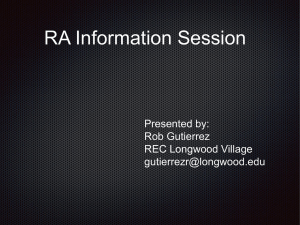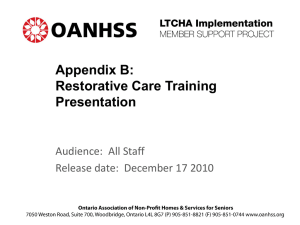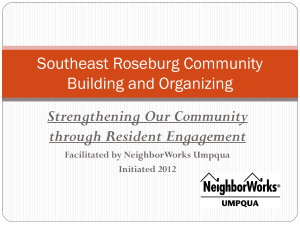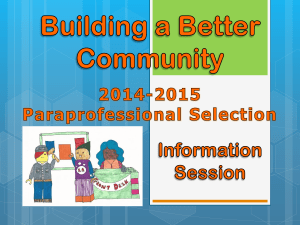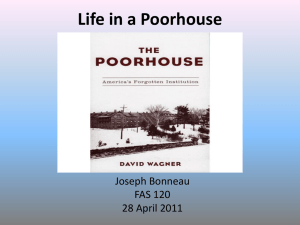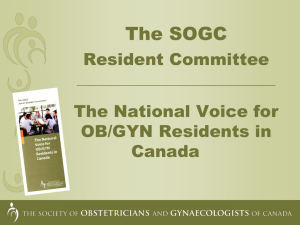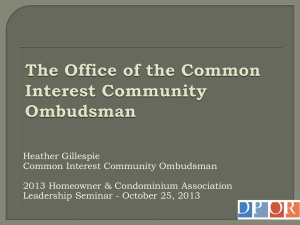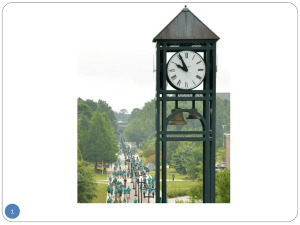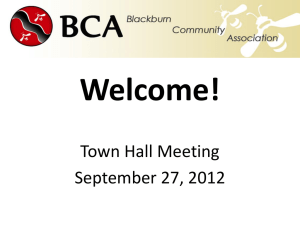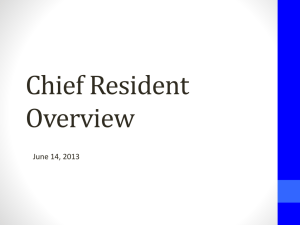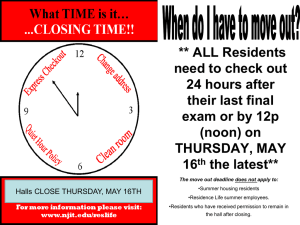Resident and Family Councils PowerPoint Presentation
advertisement
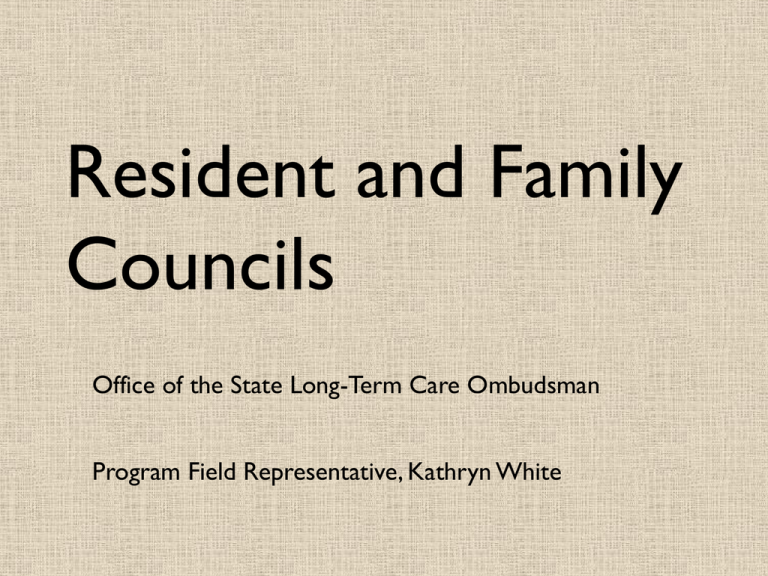
Resident and Family Councils Office of the State Long-Term Care Ombudsman Program Field Representative, Kathryn White Why have a council? Image 1: Goodwin House Alexdria Resident Council The lives of the residents are heavily controlled by laws, rules, and policies set by the government and nursing home. Compromises in lifestyle become necessary due to health problems and living conditions. These compromises and controls can make nursing home residents feel their opinions and preferences do not matter. A council gives the residents an active role in their life and a chance to influence decisions that affect them. http://www.atlantalegalaid.org/fact16.htm What is a resident council? Resident Council-Resident councils are organized, self-governing, decision-making groups of long-term care residents meeting regularly to voice their needs and concerns and to have input into the activities, policies, and issues affecting their lives in the facility. http://health.mo.gov/seniors/ombudsman/pdf/HowToOrganizeAnd_DirectAnEffectiveResidentCouncil.pdf What is a family council? Family Council- A family council is a self-led, selfdetermining group of consumers - families and friends of nursing home residents that: • Works to improve the quality of care and quality of life of the facility’s residents. • Provides families with a voice in decision-making that affects them and their loved ones. http://health.mo.gov/seniors/ombudsman/pdf/FamilyCouncils.pdf Education Communication Understand Voice Policy Advocate Surroundings Friendship • Providing general information about long -term care. • Effective way between staff and residents/ families. • Departments as they relate to the resident’s care and service needs. • Present ideas, suggestions, and concerns and to work cooperatively towards a solution. • Learn reasons for proposed changes in policy and procedures and promote feedback concerning potential changes. • Help individuals speak out about concerns and help overcome fear of retaliation. • Improve the atmosphere. • Promote support. • http://www.tjaaa.org/resident-family-councils-nursing-homes.aspx Family council is not…. FAMILY NIGHT is a name used in many facilities for occasional educational or social functions planned and hosted by nursing home staff for families and friends of the home’s residents. While these programs may be beneficial, they are not substitutes for family councils. A RESIDENT COUNCIL: Many homes have resident councils. It may seem at first glance that the two groups are the same. Combining the home’s resident and family councils into one group may even be considered. However, this ignores the fact that residents and their families have different interests, needs and abilities. Combined resident/family councils are usually dominated by the families, who are quicker and better able, in many cases, to express themselves. Residents and families need their own councils geared to their special situations and interests. A VOLUNTEER GROUP OR AUXILIARY: Occasionally, a family council will be started to meet a need within the facility. Family councils provide many valuable services to residents, but they must never be replacements for adequate staff. Also, a council should not provide items or services that the home is required by law to provide. http://econline.net/Knowledge/Articles/familycou ncil.html Where to start? Do they want a council? Are staff and administration willing to help the council get started? How to introduce members to the council? How to participate? Image 2: avoidance300.jpg Laws and Regulations Older Americans Act Omnibus Reconciliation Act of 1987 (OBRA ’87) Federal Regulations State Nursing Home Regulations Assisted Living Regulations Nursing Home Care Act Enforcement Older Americans Act Every State Required to have a Long-Term Care Ombudsman Program. The OAA set out specific objectives for maintaining the dignity and welfare of older individuals and created the primary vehicle for organizing, coordinating and providing community-based services and opportunities for older Americans and their families. Section. 712. STATE LONG-TERM CARE OMBUDSMAN PROGRAM. (H)(i) provide for training representatives of the Office; (ii) promote the development of citizen organizations, to participate in the program; and (iii) provide technical support for the development of resident and family councils to protect the well-being and rights of residents OBRA ‘87 1987 Congress passed the Nursing Home Reform Law as part of the Omnibus Reconciliation Act of 1987 (OBRA 87). Established national standards for care and residents’ rights for people in nursing homes. Each resident be provided with services sufficient to attain and maintain his or her highest practicable physical, mental, and psychosocial well-being. New federal requirements were established, including: a resident assessment process leading to development of an individualized service plan, the right to organize and participate in family or resident councils, the right to be free of unnecessary restraints (physical or chemical), and specific requirements for those most responsible for resident dignity and care. Federal regulation 42 C.F.R. § 483.15 explains the role of the resident and family council: (c) Participation in resident and family groups. (1) A resident has the right to organize and participate in resident groups in the facility. (2) A resident's family has the right to meet in the facility with the families of other residents in the facility; (3) The facility must provide a resident or family group, if one exists, with private space; (4) Staff or visitors may, attend meetings at the group's invitation; (5) The facility must provide a designated staff person responsible for providing assistance and responding to written requests that result from group meetings; (6) When a resident or family group exists, the facility must listen to the views and act upon the grievances and recommendations of residents and operational decisions affecting resident care and life in the facility. State Nursing Home Regulations OSDH 310: 675-7-7.1 Resident’s Advisory Council Establish Council Consist of all current NH facility residents or their designated representative, facility coordinate and assist , and respond to request No one from facility member Private space Minutes prepared/ maintained by staff Communicate to administrator opinions/ concerns Assisted Living Rules OSDH 310:663-15-1 Residents Rights Observe all residents rights and responsibilities enumerated under Title 63 O.S. Section 1-1918 (B) http://www.ok.gov/health2/documents/LTC%20Continuum%20of%20Care%20&%20AL%20Rules.pdf Nursing Home Care Act Title 63 O.S. State Statue 63-1-1918 Rights and Responsibilities 2. Every resident shall have the right to have private communication, including…..and meetings of family and resident groups………. 3a (1) Present grievances……. 3b The family of residents shall have the right to meet in the facility with other residents’ families. http://www.ok.gov/health2/documents/HRDS%20675%20NHCA%201113.pdf Enforcement F-243 This requirement does not require that residents’ organize a resident or family group, however facilities must allow them to do so without interference. State Statue 483.15 © Participation in Resident and Family Group -organize and participate -family members meet with other families -private space -staff/visitors attend by invitation -provide staff person If one does not exist, determine if residents have attempted to form one but have been unsuccessful; and if so, why. http://www.cms.gov/Regulations-and-Guidance/Guidance/Manuals/downloads/som107ap_pp_guidelines_ltcf.pdf Enforcement F-244 State Statue 483.15 © (6) When a resident or family group exists, the facility must listen to the views and act upon the grievances and recommendations of the residents and family members concerning proposed policy and operational decisions affecting resident care and life in the facility. http://www.cms.gov/Regulations-and-Guidance/Guidance/Manuals/downloads/som107ap_pp_guidelines_ltcf.pdf Preparation for Meeting Leadership Who will facilitate? Liaison Regular Meeting Time Goals/ Ground Rules Meeting Length Confirm Meeting Room/ Refreshments Minutes By-Laws Agenda Topic/Guest Speakers/ Presentation Meeting Procedures Image3: clipart_people_desk_meeting_19909_1920x1200.jpg Enthusiasm Agenda Sign-in Sheet Invite Initial Meeting Next Meeting Handouts Guest Speaker Participation and Sharing Leadership & Structure Models Of Leadership Traditional/Town Meeting-Chair Person/ President, Vice-Chairperson/ Vice-President, Secretary, and Treasurer. Co-Leaders- Two members share responsibility. Leadership Committee-several family members share responsibilities, or for first few months then have formal election. Leadership committee with rotation Alternating Leader Representative-residents bedfast, serving as liaison for other residents. Leadership & Structure Elections Job Description Training for Leaders Term Limits What makes a good leader? Identify Personal Qualities Relate to People Lifetime Learners Seek Assessment Image 3: Does it look like what makes up a good leader. Duties of Officers Chairperson/ President-Presides over meeting, seeing bylaws and procedures are followed, keeping control over meeting, maintaining impartiality, coordinates activities, maintain communication with staff. Vice Chairperson/ Vice President-Fill in when chairperson is unable to fulfill duty. Secretary-Taking notes at meetings, recording and maintaining a file of the minutes, maintaining correspondence, and having by-laws handy at meetings in case of questions. Treasurer- Receiving and dispensing funds, maintaining proper financial records, and reporting to the council on status of treasury. http://health.mo.gov/seniors/ombudsman/publications.php Liaison/ Staff Assistant A facility appointed staff advisor or liaison is required to support the council and respond to written requests/concerns arising from the council meetings. The liaison may or may not be invited to attend the meeting. In the beginning be clear of the role of the assistant. http://www.tjaaa.org/resident-family-councils-nursing-homes.aspx • • • • • • • • • Help to tell families/ new residents Advise council on changes in facility Explain the facility's policies and procedures Help council communicate its questions Help to book guest speakers Provide refreshments and make copies Share information Educate staff Enthusiasm No…No Planning and running meetings Speaking on behalf of residents Selecting meeting times and dates, topics, activities… Image 4: Runnells Hospital Staff Members Honored by Resident Council Parliamentary Procedure Robert’s Rules of Order The Standard Code of Parliamentary Procedure ( formerly the Sturgis Standard Code of Parliamentary Procedure) Why Do Groups Use Parliamentary Procedure? To give everyone a chance to be heard To allow members to participate in an orderly group To establish and maintain order in a meeting To prevent confusion when discussing club business To keep things moving Image 6: graphics-agenda-603334.jpg Opening Activity-Roll call/ name tags everyone becomes acquainted Read Minutes from last meeting-what has happened since Receive Reports-discuss needs, concerns, and activities of residents they represent Unfinished Business- review from previous meeting New Business-New concerns and ideas Resident Concerns Facility News-information to share from department heads Social Time-Wind down/ refreshments Minutes WHAT: Accurate record made of all happenings at each meeting, who served, facility’s actions in response to concerns of the council. WHY: Communication tool/sharing outcomes and useful written record. WHO: Secretary takes minutes or designate someone. Brief, Legible, and for anyone to understand, typed and copies made for distribution (given to all residents or posted). The name of the person presiding Members present Who took minutes Date and time of the meeting All items discussed, actions taken Date and time of next meeting Formality of Structure Ensure that the council knows where it is heading and that there is a democratic and fair way for the council to do its work and make decisions. http://theconsumervoice.org/uploads/files/family-member/Developing-andSuporting-Family-Councils.pdf By-laws Policies By-Laws Written guidelines by which the group operates. Name Purpose/ Mission Statement Membership (criteria) Officers and committees (tiles, responsibilities, terms) Meetings (when and how is conducted) Elections (nomination, procedures) Rules of Order (raise hand, talking stick) Future Amendments Policies Communication with administrator/staff Communication of concerns to administrator/ staff Communication with other family members Communication with residents Handling individual concerns Problem Solving Will this help improve resident care and residents’ lives? Narrow down and pinpoint the specific problems Learning current policy on a facility issue Learning what laws and regulations require The role of the council is not just to identify problems, but to offer ideas and suggestions about how to resolve them. http://www.ltcombudsman.org/sites/default/files/norc/issues/Omb-and-Family-CouncilsLAFMC.pdf Promoting Many family councils have active participation of 10% of families of the residents. http:/theconsumervoice.org/uploads/files/issues/promoting-participation-2012.pdf Flyer Newsletter Membership Form Permission to Contact Greeter in lobby Mailings Staff What to say?……………. Image 8 megaphone.png Ombudsman Role Yes! Encouragement! (Yoga instructor from Couples Retreat Movie) Coach Educator/ Trainer Connector Mediator Communication/ Meeting • • • • • • • • • • • • • • • • Respect Trust, Care, and Concern Good Listener Observation Give/ Receive/ Share Information Confidentiality Recognition Patience Sense of Humor Criticism Mistakes Laugh at Self People’s Well-Being Admit not knowing Alternatives Praise (Retrieved from Resident/Family Council folder in Ombudsman Office) Communication/ Processing Concerns Officers having regular monthly meeting with administrator/ keep members informed (make an appointment in advance). Allow reasonable time for complaint to be resolved. Hear constructive input/ get all facts. Address small concerns before they become major problems. Work toward meaningful change, avoid unreasonable demands. Present ideas in a non-threatening way (friendly, but firm). Avoid generalities and exaggerations. Show appreciation. Facility clear on the purposes and rights of your council / value of cooperation. (Retrieved from Resident/Family Council folder in Ombudsman Office) Obstacles FEAR OF RETALIATION LACK OF INTEREST LACK OF TIME LACK OF INFORMATION LACK OF SUPPORT FROM THE FACILITY DISCOURAGED EASILY LOW PARTICIPATION NOT WANT LEADERSHIP ROLE Benefits In-service training Improve staffing assignments and stopped staff rotation Survey, improvements to facility Better service to residents (food, daily care, bathing time, activities, etc...) Grievance Forms at nurses station Staff appreciation and educational programs Billing/ Delivery issue with pharmacy Council put in admission packet Open lines of communication Resources How to Organize and Direct an Effective Resident Council: A Technical Assistance Manual of the Missouri Long-Term Care Ombudsman Program. Emmelene W. Kerr. Missouri Long-Term Care Ombudsman Program. This manual covers all aspects of council work – from forming a new council to improving an existing council Written by a former coordinator in the Missouri Ombudsman Program who draws upon many years of ombudsman experience with resident councils, ombudsmen will find straight forward information and tips to use when assisting in the formation or strengthening of a resident council. http://health.mo.gov/seniors/ombudsman/publications.php Family Guide to Effective Family Councils Prepared by Robyn Grant for The Legal Assistance Foundation of Metropolitan Chicago and the Evanston Commission on Aging Additional copies: Kathy Swanson c/o Legal Assistance Foundation of Metropolitan Chicago 111 W. Jackson Boulevard 3rd floor Chicago, IL 60604 http://theconsumervoice.org/uploads/files/family-member/Guide-toEffective-Family-Councils.pdf Long Term Care Ombudsman Guide to Developing and Supporting Family Councils Prepared by Robyn Grant for The Legal Assistance Foundation of Metropolitan Chicago 111 W. Jackson Boulevard 3rd floor Chicago, IL 60604 http://theconsumervoice.org/uploads/files/family-member/Developing-and-Suporting-Family-Councils.pdf Parliamentary Charts and Handouts http://www.jimslaughter.com/uploads/OrderofBusiness.pdf Image References Image 1: Retrieved from http://ts1.mm.bing.net/th?&id=HN.608049579972823833&w=315&h=300&c=0& Image 2: Retrieved from http://www.etftrends.com/wp-content/uploads/2010/07/avoidance300.jpg Image3: Retrieved from http://www.northsidenaz.org/images/clipart_people_desk_meeting_19909_1920x1200.jpg Image 4: Retrieved from http://ts1.mm.bing.net/th?&id=HN.608038842553010247&w=300&h=300&c=0 Image 5: Retrieved from http://www.unioncountynj.org/news/2008/0803runemployee.jpg Image 6 Retrieved from http://radbusinessassociation.files.wordpress.com/2012/03/graphics-agenda-603334.jpg Image 7: Retrieved from http://1.bp.blogspot.com/-Wl3ehSD-Iv0/UF3c5qGxtfI/AAAAAAAAARI/OhhmeHNCUmU/ Image 8 Retrieved from http://www.mistera.co.uk/uploaded/megaphone.png Image 9: Retrieved from http://www.crossfitboilerroom.com/wp-content/uploads/2013/11/carlos-ponce-yoga-



